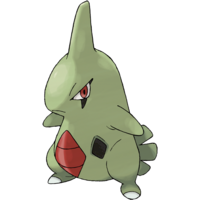From Bulbapedia, the community-driven Pokémon encyclopedia.
|
|
| Line 310: |
Line 310: |
| *Larvitar and its [[Evolution|evolutionary line]] are amongst the few Pokémon to be placed directly behind a [[legendary Pokémon]] in a regional [[Pokédex]]. | | *Larvitar and its [[Evolution|evolutionary line]] are amongst the few Pokémon to be placed directly behind a [[legendary Pokémon]] in a regional [[Pokédex]]. |
| *Larvitar can learn {{m|Iron Defense}} by breeding, although not by move tutor. The same goes for {{m|Outrage}}. | | *Larvitar can learn {{m|Iron Defense}} by breeding, although not by move tutor. The same goes for {{m|Outrage}}. |
| * Along with {{p|Dratini}}, {{p|Trapinch}}, and {{p|Remoraid}}, Larvitar is one of the very few basic-stage Pokémon to learn [[Hyper Beam]] by level up. | | * Along with {{p|Dratini}}, {{p|Trapinch}}, and {{p|Remoraid}}, Larvitar is one of the very few basic-stage Pokémon to learn {{m|Hyper Beam}} by level up. |
|
| |
|
| ===Origin=== | | ===Origin=== |
Revision as of 18:36, 21 May 2009
|
|

Artwork from GSC
|
|
|
|
|
|
|
|
|
|
|
|
Height
2'00"
Imperial
|
0.6 m
Metric
|
2'00"/0.6 m
Red-Striped
|
0'0"/0.0 m
Blue-Striped
|
0'0"/0.0 m
|
|
|
Weight
158.7 lbs.
Imperial
|
72.0 kg
Metric
|
158.7 lbs./72.0 kg
Red-Striped
|
0.0 lbs./0.0 kg
Blue-Striped
|
0.0 lbs./0.0 kg
|
|
|
|
|
|
|
|
|
|
|
|
|
EV yield
HP
0
|
Atk
1
|
Def
0
|
Sp.Atk
0
|
Sp.Def
0
|
Speed
0
|
| Base Exp.: 67
|
Battle Exp.: 671*
|
|
|
|
|
Larvitar (Japanese: ヨーギラス Yogiras) is a dual-type Rock/Ground Pokémon.
It evolves into Pupitar starting at level 30, who evolves into Tyranitar starting at level 55.
Biology
Physiology
Larvitar are small dark green reptilian Pokémon with rocky skin. They have an erect spine on top of their heads and several holes or ports on the sides of their bodies. They also have a red rhombus-shaped belly of sorts.
Gender differences
None.
Special abilities
Behavior
Larvitar are usually quiet. Due to its larval stage, their main interest focuses on eating. Whenever a Larvitar is spotted, it's likely to be seen feeding on soil.
Habitat
Larvitar usually live in mountains, hills, and sometimes, in caves. The mountains they live in are usually their meals. A single Larvitar can eat a mountain in a few weeks.
Diet
- Main article: Pokémon food
Larvitar feeds on soil.
In the anime
Larvitar first appeared in Pikachu's PikaBoo. The Rock Skin Pokémon was, in the words of the narrator, "in charge of guarding the garden." Pikachu and co. invited Larvitar's friends (but not Larvitar itself) to a game of Hide 'n' Seek. Larvitar was feeling left out and accidentally kicked a rock at a lawnmower (which went haywire afterwards).
Ash had a Larvitar he hatched from an egg given to him by Professor Elm to deliver to its mother, living on Mt. Silver.
In Pinch Healing, a Larvitar was being babysat by a Poké-Sitter named Matt. Ash and his friends were helping him with his job. The Larvitar was shy, and used Sandstorm when confronted. By the end of the episode, however, it warmed up to the group, particularly May.
In the manga
Crystal's Arcanine was injured by attacked by a Larvitar five years prior to the plot of the volume, causing it to go on a rampage until Crystal calmed it down. The same Larvitar returned when Crystal returned to Mt. Mortar, tormenting Crystal and Arcanine until her Bayleef defeated it.
In the TCG
- Main article: Larvitar (TCG)
Game data
NPC appearances
Pokédex entries
| This Pokémon was unavailable prior to Generation II.
|
|
|
| Generation II
|
|
| Gold
|
It feeds on soil. After it has eaten a large mountain, it will fall asleep so it can grow.
|
| Silver
|
It is born deep underground. It can't emerge until it has entirely consumed the soil around it.
|
| Crystal
|
Born deep underground, this Pokémon becomes a pupa after eating enough dirt to make a mountain.
|
| Stadium 2
|
It feeds on soil. After it has eaten a large mountain, it will fall asleep so it can grow.
|
|
|
| Generation III
|
|
| Ruby
|
Larvitar is born deep under the ground. To come up to the surface, this Pokémon must eat its way through the soil above. Until it does so, Larvitar cannot see its parent's face.
|
| Sapphire
|
Larvitar is born deep under the ground. To come up to the surface, this Pokémon must eat its way through the soil above. Until it does so, Larvitar cannot see its parent's face.
|
| Emerald
|
A Larvitar is born deep under the ground. It must eat its way through the soil above and reach the surface for it to see its parents' faces.
|
| FireRed
|
It is born deep underground. It can't emerge until it has entirely consumed the soil around it.
|
| LeafGreen
|
It feeds on soil. After it has eaten a large mountain, it will fall asleep so it can grow.
|
|
|
| Generation IV
|
|
| Diamond
|
A Pokémon that eats soil. Once it has eaten a large mountain, it goes to sleep so it can grow.
|
| Pearl
|
A Pokémon that eats soil. Once it has eaten a large mountain, it goes to sleep so it can grow.
|
| Platinum
|
A Pokémon that eats soil. Once it has eaten a large mountain, it goes to sleep so it can grow.
|
| HeartGold
|
{{{heartgolddex}}}
|
| SoulSilver
|
{{{soulsilverdex}}}
|
|
|
|
|
|
|
Game locations
| This Pokémon was unavailable prior to Generation II.
|
|
|
|
|
|
|
|
|
|
|
|
|
In side games
Base stats
| Stat
|
Range
|
| At Lv. 50
|
At Lv. 100
|
50
|
|
110 - 157
|
210 - 304
|
64
|
|
62 - 127
|
119 - 249
|
50
|
|
49 - 112
|
94 - 218
|
45
|
|
45 - 106
|
85 - 207
|
50
|
|
49 - 112
|
94 - 218
|
41
|
|
41 - 102
|
78 - 199
|
Total: 300
|
Other Pokémon with this total
|
- Minimum stats are calculated with 0 EVs, IVs of 0, and (if applicable) a hindering nature.
- Maximum stats are calculated with 252 EVs, IVs of 31, and (if applicable) a helpful nature.
|
Type effectiveness
| Under normal battle conditions in Generation V, this Pokémon is:
|
|
|
|
|
|
|
|
|
|
|
|
|
Learnset
Template:Learnset introMoves in Italics aren't STAB for Larvitar, but are for some/all evolutions.
|- style="text-align:center"
| style="text-align:left" | rock
| style="background:#915121" | ground
| style=" background:#FFF" | 4
| style=" background:#FFF" | 2
| style=" background:#FFF" | Larvitar
| style="display:none; background:#FFF" | {{{6}}}
Template:Mlentry4
Template:Mlentry4
Template:Mlentry4
Template:Mlentry4
Template:Mlentry4
Template:Mlentry4
Template:Mlentry4
Template:Mlentry4
Template:Mlentry4
Template:Mlentry4
Template:Mlentry4
Template:Mlentry4
Template:Mlentry4
Template:Movelist/note
Template:Movelisttm
Template:Mlentry4
Template:Mlentry4
Template:Mlentry4
Template:Mlentry4
Template:Mlentry4
Template:Mlentry4
Template:Mlentry4
Template:Mlentry4
Template:Mlentry4
Template:Mlentry4
Template:Mlentry4
Template:Mlentry4
Template:Mlentry4
Template:Mlentry4
Template:Mlentry4
Template:Mlentry4
Template:Mlentry4
Template:Mlentry4
Template:Mlentry4
Template:Mlentry4
Template:Mlentry4
Template:Mlentry4
Template:Mlentry4
Template:Mlentry4
Template:Mlentry4
Template:Mlentry4
Template:Mlentry4
Template:Mlentry4
Template:Mlentry4
Template:Mlentry4
Template:Mlentry4
Template:Mlentry4
Template:Mlentry4
Template:Movelist/note
Template:Eggmoves
Template:Mlentry4
Template:Mlentry4
Template:Mlentry4
Template:Mlentry4
Template:Mlentry4
Template:Mlentry4
Template:Mlentry4
Template:Mlentry4
Template:Mlentry4
Template:Mlentry4
Template:Eggmoves/note
Template:Tutor
Template:Mtentry4
Template:Mtentry4
Template:Mtentry4
Template:Mtentry4
Template:Mtentry4
Template:Mtentry4
Template:Mtentry4
Template:Mtentry4
Template:Mtentry4
Template:Mtentry4
Template:Mtentry4
Template:Mtentry4
Template:Mtentry4
Template:Mtentry4
Template:Mtentry4
Template:Mtentry4
|- style="background:#CBC7AD"
| colspan="13" | Bold indicates a move that gets STAB
Italic indicates a move that gets STAB only from an Evolution of this Pokémon
A colored initial indicates that the move is not available to be tutored in this game,
while a colored background indicates that the move is available.
|}
|}
Side game data
Template:Side game
Evolution
Template:Evobox/2
Sprites
Trivia
Origin
It appears to share similarities with dinosaurs.
Its penchant for eating mountains, fences, or probably anything else may come from the legend of the Tarasque.
Name origin
Larvitar's name is based on larva. Its Japanese name may be a combination of 幼児 yōji, baby or child, or 幼生 yōsei, larva, and 嫌い kirai, hate, or Anguirus, a Japanese kaijū.
In other languages
- German: Larvitar
- French: Embrylex - From embrillion (embryo) and silex (flint).
- Korean: 애버라스 Aebeoraseu
Related articles
External links

|
This Pokémon article is part of Project Pokédex, a Bulbapedia project that aims to write comprehensive articles on each Pokémon species, as well as Pokémon groups and forms.
|


































